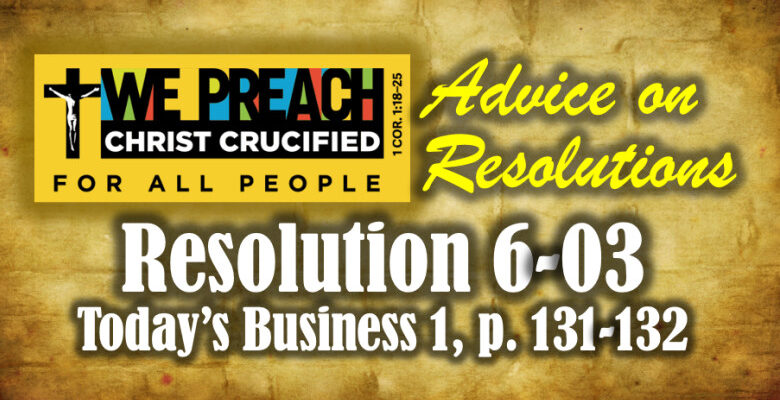What should concern delegates?
Again, everyone wants a well-formed pastor and can support this resolution in concept. However, this Resolution is another “answer” resolution seeking a “problem.” The “problem” they want to address is the existence of the SMP Program.
The sixth Whereas (page 132, lines 5-7) quotes a 2013 resolution and suggests “confusion” exists among members of Synod regarding the Specific Ministry Pastor program without reporting the confusion. It seems to be a well-accepted program in the LCMS. What are the “ambiguities” referred to regarding the Specific Ministry Pastor route to ordination and service in the church?
Similarly, the tenth Whereas (lines 24-26) reports “New, non-approved routes to ministerial service” without sharing what they are — or what problems with them exist.
Delegates need more reporting and less declaring before making decisions that affect congregations.
And titles of resolutions should reflect what they are truly about. This resolution is substantially about limiting the SMP program and stopping any “non-approved” routes to serving the Church rather than supporting a process for well-formed pastors. It assumes that the M.Div. program of studies will accomplish what only the Word of God and the work of the Holy Spirit can do. Has that been the experience of the Church?
What can be done about it?
Ask the Floor Committee to report on the “confusion in Synod” regarding the SMP program. What are people confused about?
Ask from the Convention floor for a report from the District Presidents on their “New, non-approved routes to ministerial service,” if any.
Ask to have a definition of “ministerial service” (Page 132, line 24). This is a new term not defined in our Synod Bylaws. Terms that are not defined are open to broad interpretation in the future.
Ask how the existence of the SMP program and the several hundred SMP pastors has limited the Gospel outreach ministry of the “General” pastors who have received M.Div. degree training.
Ask how we can trust the same seminary faculty to certify M.Div. pastors if we can’t trust them to certify SMP pastors.
Ask how the more robust training of the M.Div. program has increased the number of people coming to Christ and the baptismal font. Exactly how many hours of study in the M.Div. program are devoted to evangelism training and witnessing experience? And what has been the effect of that training on the outcomes needed by congregations — specifically witnessing to and reaching their communities with the saving grace of the Lord Jesus Christ?
Ask why we would ever try to stop or limit a program that is providing congregations with pastors who have a “rite vocatus” and appropriate training for what congregations need them to do? Has the M.Div. program produced what congregations need from a pastor beyond preaching the Word and administering the Sacraments?
Ask delegates if they rather see more empty pulpits and more empty pews in more LCMS churches because they are not being served by an ordained pastor? Limiting the ways men may be trained to serve limits the number of men serving.

